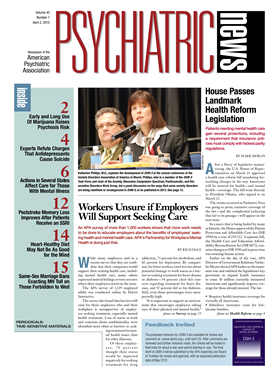After a flurry of legislative maneuvering, the U.S. House of Representatives on March 21 approved a health care reform bill mandating far-reaching changes in the way Americans will be insured for health—and mental health—coverage. The bill went directly to President Obama, who signed it on March 23.
The events occurred as Psychiatric News was going to press; extensive coverage of the law—and the complicated jockeying that led to its passage—will appear in the next issue.
In a move that is being hailed by many as historic, the House approved the Patient Protection and Affordable Care Act (HR 3590) by a vote of 219-212. A separate bill, the Health Care and Education Affordability Reconciliation Act (HR 4872), contains changes to HR 3590 and at press time was awaiting Senate action.
Earlier on the day of the vote, APA Director of Government Relations Nicholas Meyers alerted APA leaders to the imminent vote and outlined the legislation's key provisions to expand health insurance to some 30 million currently uninsured Americans and significantly improve coverage for those already insured. The law
•.
Requires health insurance coverage for virtually all Americans.
•.
Subsidizes insurance costs for low-income families.
•.
Permits dependents to be covered on parents' insurance to age 26.
•.
Bars coverage exclusions based on preexisting conditions.
•.
Prevents insurers from dropping enrollees who become ill.
•.
Bans lifetime coverage limits and sharply restricts annual coverage limits.
•.
Sets up health insurance exchanges to improve access to individual and small-group insurance.
The reform package also has a number of elements related to psychiatric care: coverage for mental illness, including substance use disorders, must be offered in the basic package of all plans marketed in the exchanges, and federal mental health parity regulations apply to those plans. Notably for APA members, the 5 percent bump in payment for psychiatric codes that expired in January has been extended to the end of calendar year 2010.
Further, the reform package expands Medicaid eligibility, closes the Medicare Part D “donut hole,” increases funding for community mental health centers, ensures that patients with psychiatric illness are not excluded from medical home demonstrations and permits demonstration projects for co-location of primary and behavioral health care services, and authorizes grants beginning in Fiscal 2011 to establish “depression centers of excellence.”
APA President Alan Schatzberg, M.D., expressed qualified support for the bill in a March 20 letter to President Obama, House Speaker Nancy Pelosi (D-Calif.), and Senate Majority Leader Harry Reid (D-Nev.). Meyers, in his memorandum to APA leaders, pointed out some of the bill's elements that APA and the AMA have concerns about. These include provisions regarding an independent Medicare payment commission, public reporting on physician performance, and required participation of physicians in quality-reporting initiatives.
Most importantly, he noted, the legislation does not address long-standing problems with the Medicare payment formula—although at press time legislators were jockeying around separate legislation to deal with an imminent 21 percent across-the-board cut in Medicare payment (see
Medicare Physician Fees in Flux).
While widely regarded as a landmark event, passage of the reform bill was anything but easy—the bill received no Republican support—and even ardent supporters say the bill is far from perfect. Moreover, much rides on what the Senate will do with the reconciliation bill. Under reconciliation rules, the Senate needs only a one-vote margin to pass it, and even a 50-50 vote would suffice, since Vice President Biden would then cast the decisive tie-breaking 51st vote to pass the bill.
“The passage of health reform is an important event, but is really a beginning, not an end,” said APA Medical Director James H. Scully Jr., M.D. “Many critical details need to be addressed, and we still need to see what happens with the reconciliation bill. So while we are aware of the historic action that has occurred, there is now an enormous task ahead.”
AMA President J. James Rohack, M.D., said, “While the House-passed bill isn't perfect, we cannot let the perfect be the enemy of the good when it comes to something as important as the health of Americans.”

